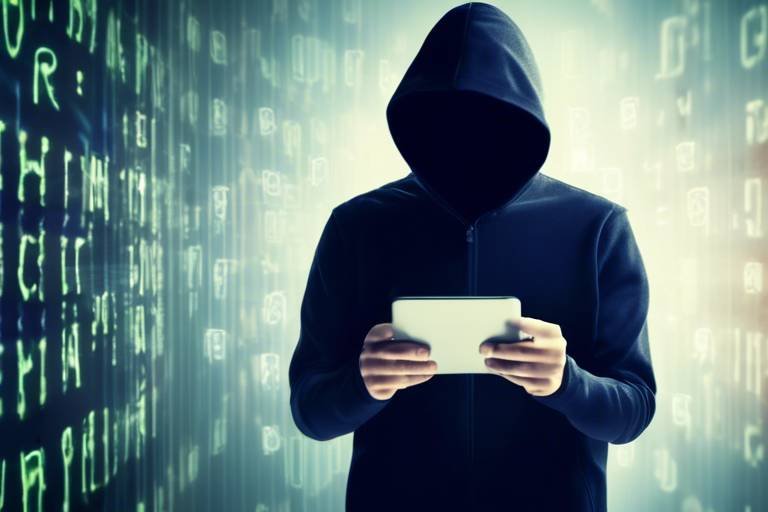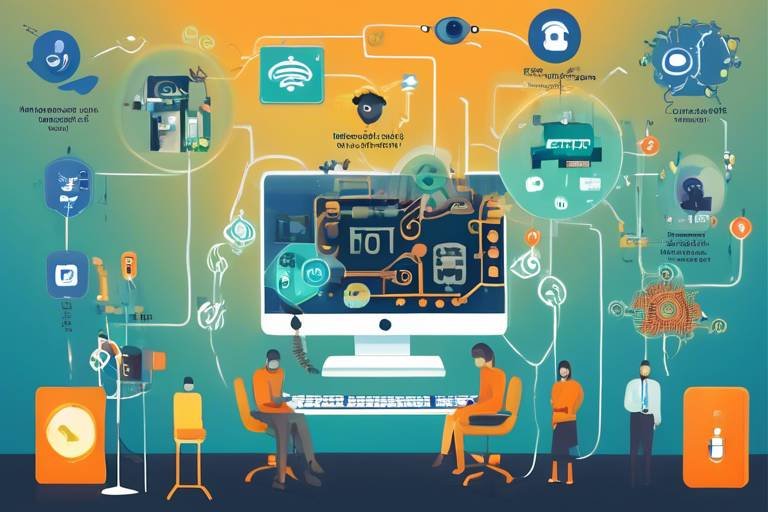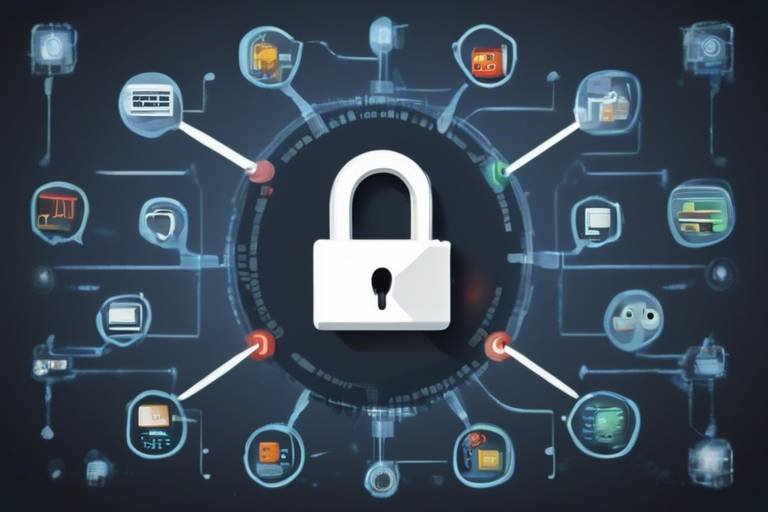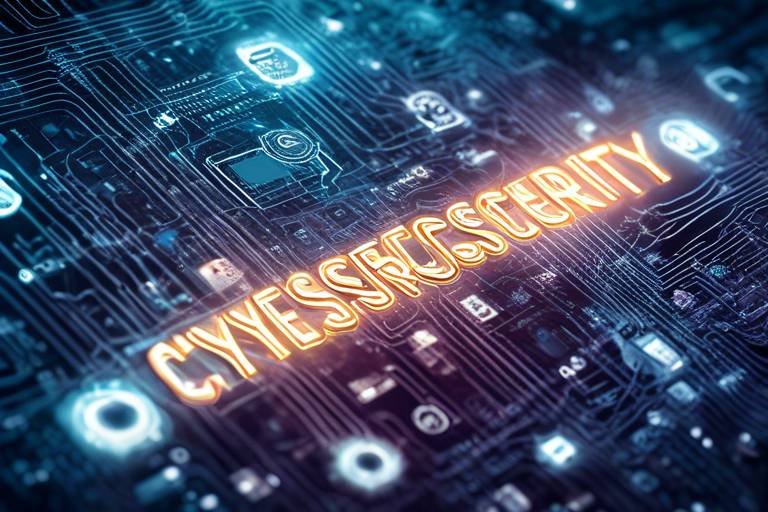Understanding the Dark Web - What It Means for Cybersecurity
The dark web is often shrouded in mystery and misconceptions, making it a topic of intrigue and concern for many. But what exactly is the dark web, and how does it impact our cybersecurity landscape? In simple terms, the dark web is a hidden part of the internet that isn't indexed by traditional search engines like Google or Bing. It requires specific software, such as Tor, to access, which anonymizes the user’s identity and location. This anonymity creates a breeding ground for both legal and illegal activities, leading to a complex web of risks and rewards.
When we think about the dark web, it’s easy to conjure images of illicit transactions and shadowy figures. However, it’s important to remember that not everything on the dark web is nefarious. There are also forums for privacy advocates, whistleblowers, and individuals seeking to communicate in oppressive regimes. Yet, the dark web’s reputation is largely defined by its association with cybercrime, making it crucial for individuals and organizations to understand its implications for cybersecurity.
Cybersecurity is a growing concern in our digital age, and the dark web presents unique challenges. For organizations, the potential for data breaches and the sale of stolen information on the dark web can lead to significant financial losses and reputational damage. For individuals, personal data can be compromised and sold, leading to identity theft and fraud. Therefore, understanding the dark web is not just about knowing what it is; it’s about recognizing the risks it poses and taking proactive measures to protect oneself.
As we delve deeper into the structure of the internet, the dark web can be better understood as one layer of a much larger ecosystem. The internet is typically divided into three layers: the surface web, the deep web, and the dark web. Each layer serves a distinct purpose and has its own characteristics. The surface web is what most users interact with daily, while the deep web contains information that is not indexed by search engines but is still legal and legitimate. The dark web, on the other hand, is the hidden layer where anonymity reigns, and the risks multiply.
To navigate the dark web safely, users must be aware of its inherent dangers. From cybercrime and illegal activities to scams and fraudulent schemes, the dark web can be a treacherous place for the unprepared. By understanding these risks, individuals and organizations can implement effective strategies to safeguard their online presence and personal information. In the coming sections, we will explore these risks in detail and outline practical steps for protecting oneself against the threats lurking in the shadows of the internet.
- What is the main difference between the deep web and the dark web?
The deep web consists of non-indexed content that is not accessible through standard search engines, while the dark web is a subset of the deep web that requires specific software to access and is often associated with illegal activities. - Is it illegal to access the dark web?
No, accessing the dark web itself is not illegal. However, many activities that take place on the dark web, such as buying illegal drugs or stolen data, are illegal. - How can I protect my personal information from being sold on the dark web?
Using strong, unique passwords, enabling two-factor authentication, and regularly monitoring your personal data for breaches can help protect you from dark web threats.

What is the Dark Web?
The dark web is a part of the internet that remains hidden from the prying eyes of traditional search engines like Google or Bing. Unlike the surface web, which is easily accessible and indexed, the dark web requires specific software, such as Tor, to access. This unique characteristic creates a concealed space where a myriad of activities occur, both legitimate and illicit. Imagine walking into a shadowy alley in a bustling city; while some people might be there for a simple chat, others could be involved in more dangerous dealings. This analogy captures the essence of the dark web—an environment that can be both intriguing and perilous.
To better understand the dark web, it’s essential to recognize that it forms a part of a larger structure of the internet. The internet is often conceptualized in three distinct layers:
- Surface Web: This is the visible part of the internet, consisting of websites that can be found through standard search engines.
- Deep Web: This layer encompasses all non-indexed content, including databases, private corporate sites, and more, which are not accessible via regular search engines.
- Dark Web: A small segment of the deep web, the dark web is intentionally hidden and often requires special tools for access.
While the dark web is frequently associated with criminal activities, it is important to note that it also serves legitimate purposes. For instance, it can provide a platform for whistleblowers seeking anonymity or for individuals living under oppressive regimes to communicate freely. However, its reputation largely stems from the darker side, where activities like drug trafficking, illegal arms sales, and the exchange of stolen data thrive. This duality makes the dark web a complex and often misunderstood segment of the internet.
As we delve deeper into the implications of the dark web on cybersecurity, it's crucial to remain aware of the potential risks it poses. Understanding what the dark web is and how it operates can equip individuals and organizations with the knowledge to protect themselves from its lurking dangers.

The Structure of the Internet
Understanding the internet's structure is crucial to grasping the dark web's place within it. The internet is often visualized as a vast ocean, with different layers of depth representing various types of content. At the surface, we have the surface web, which is the part of the internet everyone is familiar with. This is where you find websites like Google, Facebook, and Amazon. These sites are indexed by traditional search engines, making them easily accessible to anyone with an internet connection.
However, just below this surface lies the deep web, a much larger and more complex layer that is not indexed by search engines. Imagine diving beneath the waves to discover a hidden world teeming with information that is not meant for the public eye. This includes databases, private corporate sites, medical records, and much more. While the surface web is often likened to a busy city street, the deep web is akin to an underground network of tunnels, filled with valuable information but hidden from casual passersby.
Finally, we reach the dark web, a small fraction of the deep web that requires special software to access, such as Tor. This layer is often associated with illegal activities, but it also serves as a platform for privacy advocates and whistleblowers who seek to communicate without fear of surveillance. To illustrate the differences between these layers, consider the following table:
| Layer | Description | Accessibility |
|---|---|---|
| Surface Web | Publicly accessible websites indexed by search engines. | Easy to access with standard browsers. |
| Deep Web | Non-indexed content including databases and private sites. | Requires specific credentials or access rights. |
| Dark Web | Hidden sites requiring special software to access, often associated with illegal activities. | Requires tools like Tor for anonymity. |
This layered structure of the internet is essential for understanding the complexities of online safety and security. Each layer serves different purposes and has its own set of risks and rewards. As we dive deeper into the dark web, it becomes increasingly important to recognize the potential threats that lurk beneath the surface. By familiarizing ourselves with the structure of the internet, we can better navigate its depths and protect ourselves from the dangers that lie within.
- What is the difference between the surface web and deep web? The surface web is easily accessible and indexed by search engines, while the deep web consists of non-indexed content that requires special access.
- What tools do I need to access the dark web? To access the dark web, you typically need specialized software like Tor, which anonymizes your browsing activity.
- Is the dark web illegal? While the dark web hosts illegal activities, it also provides a space for privacy-focused individuals and whistleblowers to communicate safely.
- How can I protect myself while browsing the dark web? Using a VPN, monitoring your personal data, and being aware of potential scams can help protect your identity and information.

Surface Web vs. Deep Web
The internet is often visualized as an enormous iceberg, where only a small portion is visible above the surface while the bulk remains hidden beneath. This analogy perfectly captures the distinction between the surface web and the deep web. The surface web comprises all the websites and pages that are indexed by traditional search engines like Google and Bing. It’s the part of the internet that most users interact with daily, including social media platforms, news sites, and online shopping. In fact, studies suggest that the surface web constitutes only about 4-10% of the entire internet, making it a mere tip of the iceberg.
On the other hand, the deep web is a vast expanse that includes all the content not indexed by search engines. This includes a multitude of resources such as:
- Private databases
- Medical records
- Corporate intranets
- Academic databases
- Membership-only websites
Despite its size, the deep web is often misunderstood. Many people assume that everything in the deep web is illicit or dangerous, but that’s far from the truth. In reality, the majority of deep web content is perfectly legal and serves legitimate purposes. For instance, academic institutions utilize deep web resources to store sensitive research data, while businesses rely on private intranets for internal communication.
However, the lack of visibility in the deep web also means that users can easily overlook its potential for both good and bad. Navigating through this hidden layer requires understanding and caution, as it can lead to both valuable information and potential risks. Unlike the surface web, where search engines can guide users directly to their desired content, the deep web requires specific access credentials or permissions to reach its treasures.
In summary, while the surface web is the accessible and familiar realm of the internet, the deep web represents a hidden world filled with both potential and peril. Understanding this distinction is crucial for anyone looking to navigate the complexities of the internet safely and effectively.
- What is the main difference between the surface web and deep web? The surface web is indexed by search engines and easily accessible, while the deep web consists of non-indexed pages that require specific access.
- Is the deep web dangerous? Not all of the deep web is dangerous. While it does contain illicit content, most of it is used for legitimate purposes.
- How can I access the deep web? Accessing the deep web typically requires specific credentials or software, depending on the type of content you are trying to reach.

Characteristics of the Surface Web
The surface web is the part of the internet that most users are familiar with. It consists of websites that are easily accessible through standard web browsers like Chrome, Firefox, and Safari. This is where we spend the majority of our online time, searching for information, shopping, connecting with friends, and consuming content. Think of the surface web as the tip of the iceberg, where only a small portion is visible above the water, while the rest remains hidden beneath the surface.
One of the key characteristics of the surface web is its indexability. Search engines like Google and Bing crawl through and index these sites, making them discoverable to anyone with internet access. This means that if you’re looking for something—be it a recipe, news article, or a product—you can simply type your query into a search engine and find what you need with relative ease. The surface web is also characterized by its diversity; it encompasses a wide range of content, including:
- Social media platforms like Facebook and Twitter
- E-commerce sites like Amazon and eBay
- News websites such as CNN and BBC
- Blogs and personal websites
- Educational resources from universities and institutions
Moreover, the surface web is designed to be user-friendly. Websites are built with intuitive interfaces, allowing users of all ages and technical skills to navigate them with ease. This accessibility fosters a sense of community and engagement, as people can interact, share opinions, and collaborate online. However, it’s important to remember that while the surface web is largely safe and legal, it still contains its own set of risks, such as phishing attacks and malware. Users should always practice caution, especially when sharing personal information or clicking on unfamiliar links.
In summary, the surface web is where the majority of online interactions take place. Its characteristics of indexability, accessibility, and diversity make it an integral part of our daily lives. However, just like any other environment, it is essential to remain vigilant and informed about the potential dangers that lurk even in the most familiar spaces.
- What is the surface web? The surface web is the part of the internet that is indexed by search engines and is easily accessible to the general public.
- How does the surface web differ from the deep web? The surface web consists of publicly accessible sites, while the deep web includes non-indexed pages that are not visible to standard search engines.
- Is the surface web safe to use? Generally, yes, but users should remain cautious about sharing personal information and clicking on unknown links to avoid potential risks.

Characteristics of the Deep Web
The deep web is a vast and intricate part of the internet that often goes unnoticed by the average user. Unlike the surface web, which is easily accessible and indexed by search engines, the deep web comprises a multitude of non-indexed pages that serve various purposes. Think of it like an iceberg; what you see above the water is just a tiny fraction of the entire structure beneath. In fact, estimates suggest that the deep web is significantly larger than the surface web, hosting a wealth of information that remains hidden from traditional search engines.
One of the primary characteristics of the deep web is its diversity of content. This includes everything from academic databases and medical records to private corporate sites and confidential government resources. Many organizations use deep web resources for legitimate purposes, such as research and data storage. For instance, universities often maintain extensive repositories of academic papers and theses that are not indexed by search engines, ensuring that sensitive information remains secure and accessible only to authorized users.
Another notable feature of the deep web is its security and privacy measures. Many websites within this layer require authentication or specific credentials for access. This is particularly important for sensitive data, such as financial records or personal health information. Users must often navigate through layers of security protocols, like passwords and encryption, to reach the content they need. This focus on security makes the deep web a vital resource for businesses and individuals who prioritize confidentiality.
However, it's essential to recognize that not all activity within the deep web is benign. While there are many legitimate uses, there are also areas where illegal activities can occur. This duality makes it a complex environment. For example, some forums may discuss sensitive topics or share information that could be harmful if misused. Therefore, while the deep web can be a treasure trove of information, it also carries risks that users should be aware of.
In summary, the deep web is characterized by:
- Large Volume of Non-Indexed Content: Significantly larger than the surface web, hiding vast amounts of information.
- Security Measures: Many sites require authentication, enhancing privacy and protection.
- Diverse Applications: Used for various purposes, including academic research, corporate data storage, and more.
Understanding these characteristics is crucial for anyone looking to explore the depths of the internet safely. By recognizing the potential benefits and risks associated with the deep web, users can navigate this hidden layer with greater awareness and caution.
- What is the deep web?
The deep web refers to parts of the internet that are not indexed by traditional search engines, containing a vast amount of information that is often accessible only through specific credentials or software. - Is the deep web illegal?
No, not all of the deep web is illegal. It includes many legitimate sites and databases, but it can also host illegal activities. - How do I access the deep web?
Accessing the deep web typically requires specialized software like Tor, which helps anonymize your browsing activities. - What are the risks of using the deep web?
Users may encounter illegal activities, scams, and potential exposure to harmful content, making it essential to navigate carefully.

Accessing the Dark Web
Accessing the dark web is not as straightforward as simply typing a URL into your browser. Instead, it requires specialized software to navigate this hidden realm of the internet. The most commonly used tool is Tor, which stands for "The Onion Router." This software enables users to browse anonymously by routing their connection through a series of volunteer-operated servers, effectively masking their IP addresses. Think of it like sending a letter through multiple post offices, each one obscuring the origin of the message, making it nearly impossible to trace back to the sender.
However, before diving into the dark web, it’s crucial to understand the risks involved. The anonymity that Tor provides can be a double-edged sword. While it protects users from prying eyes, it also attracts individuals with malicious intent. Here are some key points to consider when accessing the dark web:
- Use a VPN: Before connecting to Tor, using a Virtual Private Network (VPN) can add an extra layer of security. This way, even your ISP cannot see that you are using Tor, further enhancing your privacy.
- Stay Informed: Familiarize yourself with the dark web's landscape. Knowing which sites are safe and which are notorious for scams or illegal activities can help you navigate this precarious environment.
- Be Cautious: Always exercise caution. The dark web is rife with scams, phishing attempts, and malicious software. Avoid clicking on suspicious links and only visit sites that have been recommended by trusted sources.
It's also important to note that while the dark web hosts a variety of content, not all of it is illegal. There are forums and communities that discuss topics ranging from privacy rights to political dissent. However, the presence of illegal activities can overshadow these legitimate uses. Therefore, understanding how to access the dark web safely is essential for protecting your data and identity.
In summary, accessing the dark web requires a blend of the right tools, awareness of potential risks, and a cautious approach. By utilizing software like Tor and taking proactive measures to safeguard your identity, you can explore this hidden part of the internet while minimizing the dangers that come with it.
- What is Tor? Tor is a free software that enables anonymous communication on the internet by routing your connection through multiple servers.
- Is it illegal to access the dark web? Accessing the dark web itself is not illegal, but many activities conducted there are, such as buying illegal goods or services.
- How can I protect my identity on the dark web? Using a VPN, avoiding sharing personal information, and being cautious about the sites you visit can help protect your identity.

Risks Associated with the Dark Web
The dark web is a realm shrouded in mystery and danger, presenting a myriad of risks that can catch even the most cautious users off guard. When you think about the dark web, imagine a hidden alley in a bustling city where anything can happen, both good and bad. This hidden part of the internet is notorious for harboring illegal activities, making it a breeding ground for cybercrime and scams. Understanding these risks is not just an option; it's a necessity for anyone who ventures into this shadowy domain.
One of the most alarming aspects of the dark web is its association with cybercrime. Activities such as drug trafficking, weapon sales, and the trade of stolen data are rampant. These illegal operations often operate under the radar, making it easy for unsuspecting users to stumble upon them. For example, a user looking for something innocuous could inadvertently find themselves in a marketplace where sensitive information is bought and sold, exposing them to identity theft and financial loss. The dark web is essentially a playground for hackers and criminals, where they can operate with a level of anonymity that is nearly impossible to achieve on the surface web.
Moreover, the dark web is also a hotbed for scams and fraudulent schemes. Many users, drawn by the allure of anonymity and the promise of hidden treasures, fall victim to phishing scams, fake marketplaces, and other deceptive practices. Here’s a brief overview of some common scams:
- Phishing Schemes: Fraudulent emails or messages that trick users into providing personal information.
- Fake Marketplaces: Websites that mimic real marketplaces but are designed to steal your money or data.
- Investment Scams: Promises of high returns on investments that lead to financial loss.
In this treacherous landscape, even the most tech-savvy individuals can find themselves ensnared in a scam. The anonymity of the dark web can be a double-edged sword; while it offers privacy, it also provides cover for those looking to exploit others. It’s crucial to approach any interaction on the dark web with a healthy dose of skepticism.
To further illustrate the risks, consider this table that summarizes the primary dangers associated with the dark web:
| Risk | Description |
|---|---|
| Cybercrime | Involvement in illegal activities such as drug trafficking, weapon sales, and data breaches. |
| Scams | Fraudulent schemes including phishing attacks and fake marketplaces designed to steal personal information. |
| Malware | Exposure to harmful software that can compromise your device and data. |
In conclusion, the dark web is not just a mysterious underbelly of the internet; it's a dangerous landscape filled with risks that can have real-world consequences. Whether it's falling victim to cybercrime or being scammed out of your hard-earned money, the dangers are very real. Therefore, it is essential for users to remain vigilant and informed about the potential threats they may face while navigating this hidden world.
What is the dark web? The dark web refers to parts of the internet that are not indexed by traditional search engines and require specific software, like Tor, to access.
Is the dark web illegal? While not everything on the dark web is illegal, it is widely known for hosting illegal activities, making it a risky place to explore.
How can I protect myself from dark web threats? Using a VPN, regularly monitoring your personal data, and being cautious about sharing information can help protect you from potential threats.

Cybercrime and Illegal Activities
The dark web is often portrayed as a shadowy underbelly of the internet, and for good reason. It's a breeding ground for cybercrime and illegal activities that can pose significant threats to individuals and organizations alike. Imagine walking into a dimly lit alley where anything can happen; that's essentially what the dark web feels like. Here, you can find everything from illicit drugs and firearms to stolen identities and hacking services. The anonymity that the dark web provides makes it a haven for those looking to engage in activities that would be deemed illegal on the surface web.
One of the most alarming aspects of the dark web is the trade of stolen data. Cybercriminals can buy and sell personal information such as credit card numbers, social security numbers, and login credentials. This information can be used for identity theft, fraud, and other criminal activities. For example, a stolen credit card can be purchased for as little as $5, making it incredibly easy for someone to engage in financial crimes without much investment. The following table illustrates some common types of illegal activities found on the dark web:
| Type of Activity | Description | Potential Consequences |
|---|---|---|
| Drug Trafficking | Sale of illegal drugs and substances. | Legal issues, addiction, health risks. |
| Weapon Sales | Trade of firearms and ammunition. | Violence, legal repercussions. |
| Stolen Data Markets | Buying and selling of personal information. | Identity theft, financial loss. |
| Hacking Services | Hiring hackers for various cybercrimes. | Data breaches, loss of sensitive information. |
Moreover, the dark web is also a platform for various scams and fraudulent schemes. Unsuspecting users may come across fake marketplaces that promise high-end goods at unbelievably low prices. These scams can lead to financial losses and, in some cases, can even result in users unknowingly participating in illegal activities. It's like stepping into a marketplace where everything seems too good to be true, and often, it is. The allure of anonymity can make individuals feel invincible, but the reality is that the risks are very real.
In this digital jungle, the consequences of engaging with these illegal activities can be severe. Not only do individuals face the risk of legal action, but they also expose themselves to the threat of cyberattacks and other malicious activities. Cybercriminals operating in this space are often highly skilled and can easily target those who are careless or uninformed. Therefore, understanding the landscape of cybercrime on the dark web is essential for anyone who wants to navigate the internet safely.
- What is the dark web? The dark web is a part of the internet that is not indexed by traditional search engines and requires special software to access.
- Is it illegal to access the dark web? Accessing the dark web itself is not illegal, but many activities that take place there are.
- How can I protect myself from dark web threats? Using a VPN, being cautious about sharing personal information, and regularly monitoring your data can help protect you.

Scams and Fraudulent Schemes
The dark web is a treacherous landscape where scams and fraudulent schemes thrive, much like a hidden jungle filled with deceptive vines and lurking predators. Users venturing into this shadowy realm often find themselves ensnared by the very traps they sought to avoid. One of the most common pitfalls is the prevalence of phishing schemes, where malicious actors pose as legitimate entities to extract sensitive information from unsuspecting victims. Imagine receiving an enticing offer for a product that seems too good to be true; this is often the bait used to lure individuals into providing personal details, such as passwords or credit card numbers.
Another prevalent scam involves fake marketplaces, where users believe they are purchasing illicit goods or services. These platforms can appear remarkably authentic, complete with user reviews and detailed product descriptions. However, once a transaction is made, the buyer may find themselves with nothing but disappointment as the promised goods never arrive. In many cases, the seller disappears into the ether, leaving the victim without recourse. It's crucial to remember that just because a site looks legitimate doesn't mean it is; this is a classic case of appearances being deceiving.
Moreover, the dark web is rife with identity theft schemes. Cybercriminals often buy and sell personal information, making it essential for users to remain vigilant. Victims may discover their identities being used for fraudulent activities without their knowledge. To combat this, individuals should consider implementing robust monitoring systems that can alert them to any unauthorized use of their personal data.
In summary, while the allure of the dark web may draw some in with promises of anonymity and access to exclusive content, the risks associated with scams and fraudulent schemes are substantial. Users must equip themselves with knowledge and tools to navigate these dangers effectively. By staying informed and cautious, individuals can protect themselves from falling prey to the myriad of scams that lurk in the shadows.
- What are some common scams on the dark web? Common scams include phishing schemes, fake marketplaces, and identity theft.
- How can I protect myself from dark web scams? Use strong passwords, monitor your personal information, and consider using a VPN for added security.
- Is it safe to access the dark web? Accessing the dark web can be risky; it's important to take precautions to protect your identity and personal information.
- Can I recover my identity if it’s stolen on the dark web? While recovery can be challenging, monitoring services can alert you to breaches, and you can take steps to mitigate the damage.

Protecting Yourself from Dark Web Threats
In today's digital landscape, protecting yourself from the lurking dangers of the dark web is more critical than ever. The dark web, with its veil of anonymity, can be a breeding ground for malicious activities. However, with the right strategies, you can enhance your online safety and minimize your risks. So, how do you go about safeguarding your personal information? Let’s dive into some effective measures.
One of the most effective ways to shield your identity is by using a Virtual Private Network (VPN). A VPN encrypts your internet connection, making it harder for anyone to track your online activities. This added layer of security is essential when navigating the murky waters of the dark web. Think of it as a cloak of invisibility; while it won’t make you immune to all threats, it significantly reduces your chances of being targeted. When choosing a VPN, look for reputable providers that offer strong encryption, a no-logs policy, and high-speed connections.
Another crucial step in protecting yourself is regularly monitoring your personal data. With the rise of data breaches, it’s vital to stay vigilant. There are several services available that can track your information and alert you if it appears on the dark web. These services often scan various databases and notify you if your email or personal details have been compromised. Think of it as having a security guard watching over your digital assets, ready to alert you at the first sign of trouble. By being proactive, you can take immediate action, such as changing passwords or contacting financial institutions, to mitigate potential damage.
Moreover, maintaining strong and unique passwords for your accounts is a fundamental practice. Using a password manager can help you generate and store complex passwords securely. This way, even if one of your accounts is compromised, the others remain safe. Remember, your passwords are the keys to your digital kingdom; keep them secure and never reuse them across different platforms.
Additionally, be cautious about the information you share online. Oversharing on social media can unwittingly expose you to risks. Cybercriminals often gather data from various sources to create a profile of their targets. Therefore, it’s wise to limit the amount of personal information you make public. Consider your social media privacy settings and be selective about who can see your posts.
Lastly, staying informed about the latest cybersecurity threats is essential. Knowledge is power, and understanding the tactics used by cybercriminals can help you avoid falling victim to their schemes. Regularly reading cybersecurity blogs, following relevant news, and participating in online forums can keep you updated on emerging threats and best practices for online safety.
Q: Can I access the dark web safely?
A: While it is possible to access the dark web safely, it requires using tools like VPNs and Tor, along with a strong understanding of the risks involved.
Q: What should I do if I find my information on the dark web?
A: If you discover your information on the dark web, take immediate action by changing passwords, monitoring your accounts for suspicious activity, and considering identity theft protection services.
Q: Is it illegal to access the dark web?
A: Accessing the dark web itself is not illegal; however, engaging in illegal activities while on the dark web is against the law.
Q: How can I tell if I am a victim of identity theft?
A: Signs of identity theft include unexpected account activity, receiving bills for purchases you didn’t make, or being denied credit unexpectedly. Regular monitoring can help catch these signs early.

Using VPNs for Anonymity
In the vast and often murky waters of the dark web, maintaining your anonymity is not just a luxury—it's a necessity. This is where Virtual Private Networks (VPNs) come into play. Think of a VPN as your personal cloak of invisibility; it helps shield your online activities from prying eyes, whether they belong to cybercriminals, government entities, or even your Internet Service Provider (ISP). By encrypting your internet connection, a VPN masks your IP address, making it nearly impossible for anyone to trace your online movements back to you.
When you connect to the dark web, you want to ensure that your identity remains hidden. A VPN does this by routing your internet traffic through a secure server located in a different geographical location. This not only hides your actual location but also makes it appear as though you are browsing from a different place altogether. However, not all VPNs are created equal. Some may log your data, while others may not provide the level of encryption you need. Therefore, choosing the right VPN is crucial for your online safety. Here are a few features to look for when selecting a VPN for dark web browsing:
- No-logs policy: Ensure the VPN does not keep logs of your online activities.
- Strong encryption: Look for a VPN that uses AES-256 encryption, which is currently considered the gold standard.
- Kill switch: This feature automatically disconnects your internet if the VPN connection drops, preventing accidental exposure.
- Multiple server locations: The more options you have, the better you can obscure your identity.
Using a VPN is not just about anonymity; it also enhances your overall online security. With the dark web being a hotspot for cyber threats, a VPN acts as a first line of defense against potential attacks. It helps protect your sensitive data from being intercepted by hackers who may be lurking in the shadows. However, it's important to remember that while a VPN significantly increases your security, it is not a silver bullet. Users should also employ other security measures, such as using encrypted communication tools and practicing safe browsing habits.
In summary, if you are serious about exploring the dark web, using a reliable VPN is essential. It not only helps you maintain anonymity but also adds an extra layer of protection against the myriad of threats that lurk in this hidden corner of the internet. So, before you take the plunge, gear up with a good VPN and surf the dark web with confidence!
1. What is a VPN?
A VPN, or Virtual Private Network, is a service that encrypts your internet connection and masks your IP address, providing you with anonymity while browsing online.
2. Is it safe to use a VPN on the dark web?
Yes, using a VPN on the dark web enhances your security and helps protect your identity from potential threats.
3. Can I trust all VPN providers?
No, it's essential to choose a reputable VPN provider that has a no-logs policy and strong encryption standards to ensure your data remains private.
4. Do I need anything else besides a VPN for dark web browsing?
While a VPN is crucial, you should also consider using additional security measures such as encrypted messaging apps and antivirus software.

Regular Monitoring of Personal Data
This article explores the dark web, its implications for cybersecurity, and how it affects individuals and organizations. We will delve into its structure, risks, and preventive measures to enhance online safety.
The dark web refers to parts of the internet not indexed by traditional search engines. It requires specific software to access, creating a hidden space for various activities, both legal and illegal.
Understanding the internet's structure is crucial to grasping the dark web's place within it. The internet is divided into three layers: surface web, deep web, and dark web, each serving different purposes.
The surface web includes publicly accessible sites, while the deep web consists of non-indexed pages. This distinction is essential for understanding the limited visibility of the dark web compared to the surface web.
The surface web consists of websites that are easily accessible through standard browsers, such as Google or Bing, and is where most users spend their online time.
The deep web includes databases, private corporate sites, and other content not indexed by search engines, making it significantly larger than the surface web but less visible to average users.
Accessing the dark web typically requires specialized software like Tor, which anonymizes users’ identities. Understanding how to navigate this space is crucial for recognizing its potential threats and risks.
The dark web poses various risks, including exposure to illegal activities, cybercrime, and potential scams. Awareness of these dangers is vital for users and organizations to protect themselves.
The dark web is notorious for hosting illegal activities, such as drug trafficking, weapon sales, and stolen data markets. This environment can lead to significant cybersecurity threats for unsuspecting users.
Many users on the dark web fall victim to scams, including phishing schemes and fake marketplaces. Understanding these fraudulent activities can help users avoid potential pitfalls and protect their personal information.
Implementing strategies to safeguard against dark web threats is essential. Users can take proactive measures to enhance their cybersecurity and minimize risks associated with this hidden part of the internet.
Using a Virtual Private Network (VPN) can help protect your identity while browsing the dark web, providing an additional layer of security against potential threats and unauthorized access to personal information.
Regularly monitoring your personal data is not just a good practice; it's an essential strategy in today's digital age. With the rise of data breaches and identity theft, keeping an eye on where your information resides online can save you from potential headaches down the road. Many services offer monitoring solutions that track your personal information across various databases, alerting you if your data appears on the dark web. This proactive approach acts like a digital watchdog, ensuring that you’re notified if any of your sensitive information is compromised.
Consider the following key aspects when it comes to monitoring your personal data:
- Stay Informed: Regular updates from monitoring services can keep you aware of any changes regarding your data.
- Act Quickly: If you receive an alert about a potential breach, taking immediate action can help mitigate damage.
- Utilize Security Tools: Many security software packages now include features for monitoring your data, making it easier to integrate into your online safety routine.
Moreover, it's wise to perform personal checks on common platforms where your information might be stored. For example, regularly updating your passwords and using unique passwords for different accounts can significantly reduce the risk of unauthorized access. By staying vigilant and proactive, you can help ensure that your personal data remains secure, even in the face of dark web threats.
- What is the dark web? The dark web is a part of the internet that is not indexed by traditional search engines and requires special software to access.
- Is it safe to browse the dark web? Browsing the dark web can be risky due to the potential for encountering illegal activities and scams. It's essential to take precautions.
- How can I protect my personal data? Regular monitoring of your personal data, using VPNs, and employing strong passwords are effective ways to enhance your security.
- What should I do if my data is found on the dark web? If your data is compromised, take immediate steps to secure your accounts, such as changing passwords and contacting relevant institutions.
Frequently Asked Questions
- What is the dark web?
The dark web is a part of the internet that isn't indexed by traditional search engines like Google. It requires special software, such as Tor, to access and is often associated with both legal and illegal activities.
- How does the dark web differ from the surface web?
The surface web consists of easily accessible websites that everyone can find using standard browsers. In contrast, the dark web is hidden and requires specific tools to navigate, making it less visible to the average user.
- What are the risks of accessing the dark web?
Accessing the dark web can expose users to various risks, including cybercrime, illegal activities, and scams. It's essential to be aware of these dangers to protect personal information and maintain online safety.
- Can I be tracked while using the dark web?
While using tools like Tor can help anonymize your identity, there are still risks of being tracked. Using a VPN in conjunction with Tor can provide an extra layer of security, but no method is foolproof.
- How can I protect myself from dark web threats?
To safeguard against dark web threats, consider using a VPN for anonymity, regularly monitoring your personal data for breaches, and being cautious about the information you share online.
- What should I do if my information is found on the dark web?
If your personal information appears on the dark web, it's crucial to act quickly. Change your passwords, enable two-factor authentication, and consider using identity theft protection services for added security.
- Are there legal activities on the dark web?
Yes, while the dark web is notorious for illegal activities, it also hosts legal content, such as forums for privacy advocates and whistleblowers. However, caution is still advised when navigating this hidden part of the internet.
- Is it safe to buy things on the dark web?
Buying items on the dark web can be very risky. Many transactions involve illegal goods, and there’s a high chance of scams or fraud. It's best to avoid making purchases on these platforms.



















